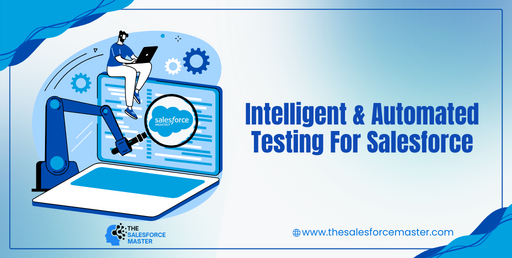 Automating testing for Salesforce requires using specific tools, frameworks, and techniques. These help ensure the accuracy and dependability of Salesforce applications by streamlining the testing process and reducing human error. Here’s how you can approach it:
Automating testing for Salesforce requires using specific tools, frameworks, and techniques. These help ensure the accuracy and dependability of Salesforce applications by streamlining the testing process and reducing human error. Here’s how you can approach it:
1. Test Automation Tools: Utilize specialized Salesforce test automation tools like Selenium WebDriver, STAF, and Salesforce DX to automate testing of user interactions, business rules, and integrations.  2. Salesforce DX: Salesforce DX provides a suite of development and testing tools that streamline the lifecycle, including testing. It includes:
2. Salesforce DX: Salesforce DX provides a suite of development and testing tools that streamline the lifecycle, including testing. It includes:
> Scratch orgs: Temporary environments for testing
> CLI commands: Automate deployments and test execution Version control integration
3. Unit Testing: Create tests for Apex classes and triggers using Salesforce’s built-in framework. This verifies that individual code units function as intended. Salesforce offers tools like Apex Test Execution and Visual Studio Code extensions for managing and running unit tests.
4. Integration Testing: Automate tests to confirm that different Salesforce application components collaborate effectively. For testing SOAP and REST APIs, employ tools like SOAP UI and Postman. Additionally, consider MuleSoft for testing integrations with external systems. 5. Performance Testing: Use tools like Apache JMeter or LoadRunner to simulate high-traffic scenarios on your Salesforce app. This allows you to evaluate its performance under different conditions, pinpoint any limitations, and enhance its scalability.
5. Performance Testing: Use tools like Apache JMeter or LoadRunner to simulate high-traffic scenarios on your Salesforce app. This allows you to evaluate its performance under different conditions, pinpoint any limitations, and enhance its scalability.
6. User Interface (UI) Testing: Utilize tools like Selenium WebDriver or Salesforce’s Lightning Testing Service (LTS) to automate the testing of user interfaces. This verifies the functionality of Salesforce Lightning components, guaranteeing a seamless user experience.
 7. Data Testing: Automate tests to verify data reliability and precision in Salesforce. Use tools like Data Loader, Salesforce Inspector, or scripts to streamline data validation.
7. Data Testing: Automate tests to verify data reliability and precision in Salesforce. Use tools like Data Loader, Salesforce Inspector, or scripts to streamline data validation.
8. Continuous Integration/Continuous Deployment (CI/CD): Incorporate testing into CI/CD workflows to automatically run tests upon code changes. Utilize tools like Jenkins, GitLab CI/CD, or Salesforce’s CI/CD solutions to automate testing and deployment.
9. AI-powered Testing: Explore emerging AI-powered testing solutions that can enhance test automation, such as AI-based test case generation, predictive analytics for identifying high-risk areas, and intelligent test maintenance tools for keeping test suites up-to-date.
Summary
By combining these approaches, organizations can achieve comprehensive and efficient testing of their Salesforce applications, ensuring higher quality, faster release cycles, and improved user satisfaction.
For more details about the salesforce, visit us at www.thesalesforcemaster.com

